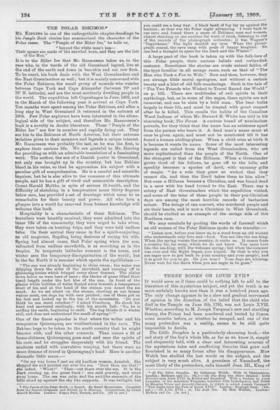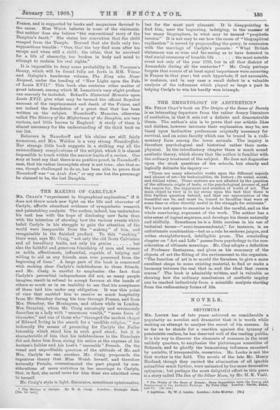THREE BOOKS ON LOUIS XVII.*
IT would seem as if there could be nothing left to add to the literature of this mysterious subject, and yet the truth is no more certainly known now than it was a hundred years ago. The only change appears to be a slow and gradual movement of opinion in the direction of the belief that the child who died in the Temple on June 8th, 1795, was not Louis XVII. Whether, according to M. Joseph Turquan's new and startling theory, the Prince bad been murdered and buried by Simon some months before, or whether he escaped, and one of the many pretenders was a reality, seems to be still quite impossible to decide.
The Little Dauphin is a particularly charming book,—the sad story of the boy's whole life, as far as we know it, simply and eloquently told, with a clear and interesting account of the mysterious tales and conflicting theories that grew and flourished in so many forms after his disappearance. Miss Welch has studied the last words on the subject, and the subject is very much alive. A grandson of Naundorlf, the most likely of the pretenders, calls himself Jean III., King of • (1) The Utile Dauphin. By Catharine Welch. With 16 Illustrations. London. Methuen and Co. 16...]—(2) The King who Never Renew. being Al emirs upon Louis XVII. by Bokard and Natinclorff. With a Preface by Jules Lemattre, of the Academie Franconia together with Introduction and Notes by Maurice Vitrac and Arnould Gnlopin, to which is added Joseph Turquan's " New Light upon the Fate of Louis XVII." London Eveleigh Nash. r16s. net ]----(3) Lads XVII.; or, Ths Arab Jena 8y Mrs, Weldon. London.
Nichols and Co. net.]
France, and is supported by books and magazines devoted to the cause. Mies Welch belieies in none of the claimants. But neither does she believe "the conventional story of the 'Dauphin's death." She states her conviction that the child escaped from the Temple. Beyond that she finds only two suppositions tenable : " One, that the boy died soon after his escape and when still a child ; the other, that he survived for a life of obscurity, too broken in body and mind to attempt to reclaim his real rights."
It is impossible to deny some probability to M. Turquan's theory, which will be found fully set forth in MM. Vitrac and Galopin's handsome volume, The King who Never Reigned, under the heading of "New Light upon the Fate of Louis XVII," This book also contains other matter of great interest, among which M. Lemaitre's very slight preface can scarcely be included. Eckard's Historical Memoirs upon Louis • XVII. give what may be termed the official Royalist account of the imprisonment and death of the Prince, and are indeed the foundation of a great deal that has been written on the subject. Naundorn Memoirs, otherwise called The History of the Misfortunes of the Dauphin, are 'very curious, and little known in England. A study of them is almost necessary for the understanding of the third book on 'our list.
Believers in Naundorff and his claims are still fairly numerous, and Mrs. Weldon is a very strong Naundorffiste. Her strange little book suggests in a striking way all the extraordinary complications of the subject, which it is almost impossible to touch within the narrow limits of a review. One may at least say that there is no positive proof, in Naundorff's case, that his rather incomplete story is not true; also that no one, though challenged to do so, has been able to prove that Naundorff was " an Arab Jew," or any one but the personage he claimed to be, the lost Dauphin.







































 Previous page
Previous page